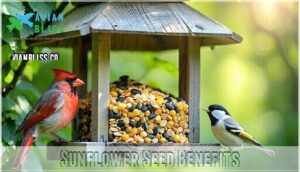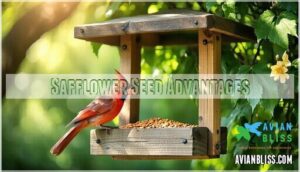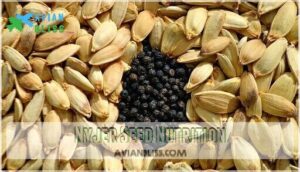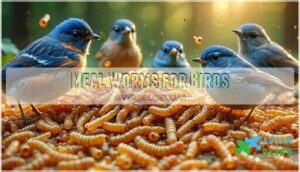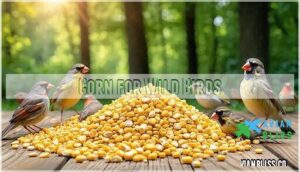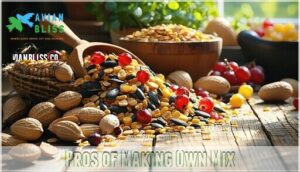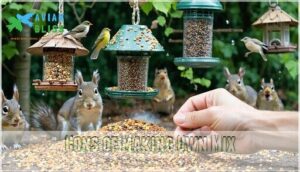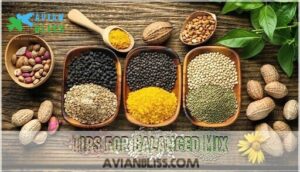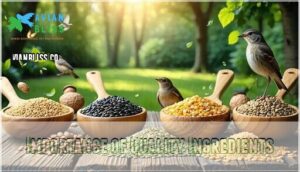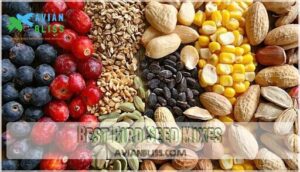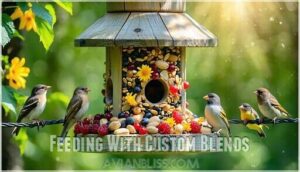This site is supported by our readers. We may earn a commission, at no cost to you, if you purchase through links.
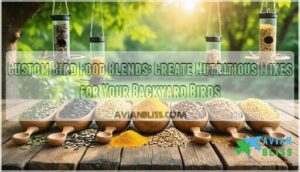
Start with versatile seeds like sunflower, safflower, or nyjer for balanced nutrition. Add mealworms for protein or cracked corn for energy. Use shelled peanuts sparingly, as they’re a treat, not a staple.
Always choose high-quality ingredients to avoid fillers that birds might skip. Mixing your own blend helps attract a variety of species while keeping pests away.
Plus, it’s satisfying to see birds enjoy what you’ve prepared. Want to perfect your mix? Balance variety with what local birds love most—because happy birds always come back to enjoy their favorite custom blends.
Table Of Contents
- Key Takeaways
- Choosing Bird Seed
- Creating Custom Blends
- Best Bird Seed Mixes
- Custom Blend Benefits
- Feeding With Custom Blends
- Frequently Asked Questions (FAQs)
- How to make your own bird feed mix?
- What is the best blend for wild bird food?
- Is it cheaper to make your own bird food?
- What is the best combination of bird feeders?
- Can you make your own bird seed mix?
- How long do custom bird seed blends last?
- Can wild birds become dependent on custom blends?
- Should custom blends change with the seasons?
- Do custom blends affect bird migration patterns?
- Are organic ingredients worth the extra cost?
- Conclusion
Key Takeaways
- You can attract more birds by mixing high-quality seeds like sunflower, safflower, and nyjer without adding fillers they won’t eat.
- Include proteins like mealworms and energy-rich options like peanuts or cracked corn, but adjust blends based on the season and local bird species.
- Proper storage in airtight containers keeps your custom mix fresh and prevents pests or spoilage.
- Regularly clean feeders to maintain bird health and avoid using spoiled or low-quality ingredients that can harm them.
Choosing Bird Seed
When choosing bird seed, focus on high-quality options that meet birds’ nutritional needs.
Select seeds like sunflower or safflower to attract your favorite species while avoiding fillers that birds won’t eat.
Sunflower Seed Benefits
Sunflower seeds are a powerhouse for bird nutrition, offering high oil content and widespread bird preferences.
A true nutritional powerhouse, sunflower seeds provide energy-rich oils and are a favorite snack for countless bird species.
Here’s why they’re a must for your bird seed mix:
- Rich Nutrition: Packed with energy from healthy fats.
- Shell Types: Choose shelled or unshelled based on cleanup needs.
- Bird-Friendly: Loved by cardinals, chickadees, and more.
- Avoid Sprouting: Use hulled seeds.
- Storage Tips: Keep cool to stay fresh.
Safflower Seed Advantages
Safflower seeds are a smart pick for your custom bird food.
They’re excellent for attracting cardinals and known for their nutritional value.
Their bitter taste makes them squirrel-resistant, keeping your feeders safe.
Store them in a cool, dry place for freshness.
For a balanced bird seed mix, combine them with other wild bird food for enhanced bird feeding results, making them a great addition to your custom bird food.
Nyjer Seed Nutrition
Nyjer seed’s small size and rich seed oil content make it a favorite for finches.
Packed with high-calorie bird food nutrients, its benefits include sustaining birds during colder months.
Always store Nyjer properly, as spoilage prevention guarantees freshness, and blending it with other bird food ingredients can enhance its appeal, making it ideal for bird food nutrition without wasting seeds.
Meal Worms for Birds
Mealworms are a standout bird food ingredient, offering impressive nutritional value.
Live mealworms attract birds like bluebirds and wrens, but dried ones are easier to store.
Feeding methods vary—mix with bird food blends or serve alone.
Over 20 species are known to enjoy mealworms.
Here’s how mealworms help:
- Boost reproduction in spring.
- Provide energy in winter.
- Attract unique species.
- Simplify feeding routines.
- Reduce mess.
Mealworms offer a range of benefits, from energy provision to attracting unique species, making them a valuable addition to any bird’s diet.
Corn for Wild Birds
Corn can be a great addition to wild bird seed blends, offering essential nutrients like carbohydrates.
Use cracked or dried kernels to make it easier for birds to eat.
Pay attention to Corn Safety—moldy corn can harm birds.
While many species enjoy it, some mightn’t prefer it, so balance it in your bird food mixes for diverse feeding.
Creating Custom Blends
Creating a custom bird food blend lets you tailor each mix to the species that visit your yard.
By using high-quality ingredients, you can attract more birds while providing them with essential nutrition.
Pros of Making Own Mix
Making your own custom bird food blends offers great perks. You save money, control every ingredient, and cater to your birds’ preferences. Plus, it cuts down on waste and guarantees freshness.
Here’s why it’s worth a try:
- Cost savings from homemade bird food.
- Full ingredient control for healthier blends.
- Attract more birds with customized recipes.
- Guaranteed freshness every mix.
Cons of Making Own Mix
Crafting homemade bird food sounds fun, but it’s tricky.
Ingredient sourcing takes effort, and incorrect bird seed types can cause nutritional imbalance.
Pest attraction—like squirrels—becomes a problem if recipes aren’t precise.
Spoilage risks also rise with poor bird food storage.
Plus, time commitment is high, and you might overspend experimenting.
Check challenges below:
| Challenge | Cause | Impact on Birds |
|---|---|---|
| Nutritional Imbalance | Incorrect mixing | Health issues |
| Pest Attraction | Poor recipe choices | Squirrels & rodents |
| Spoilage Risks | Bad storage methods | Wasted seed |
| Ingredient Sourcing | Limited availability | Higher costs |
| Time Commitment | Regular preparation | Stressful upkeep |
Tips for Balanced Mix
Creating a balanced bird feeder mix isn’t tricky! Keep these bird feeding tips in mind:
- Use proper seed ratios—include sunflower, safflower, and nyjer for diverse bird seed types.
- Add caloric density with peanuts and suet.
- Guarantee vitamin variety and mineral sources for health.
- Adjust blends for seasonal needs, like protein in winter.
Consider these popular seed options when planning your mix. Your local birds will thank you for creating a diverse bird feeder mix!
Common Mistakes to Avoid
Avoid filler seeds—they waste money and attract pests. Wrong feeders can block access to the best bird seed, frustrating finches and woodpeckers.
Don’t use stale seed that lacks nutrients or might harm birds. Overfeeding birds causes waste and invites pests.
Neglecting hygiene spreads disease; clean feeders monthly. Stick to safe bird seed mixes for healthier, happier visitors.
Importance of Quality Ingredients
When making custom bird seed blends, prioritize quality ingredients to boost bird feed freshness and nutritional value.
Here are must-follow tips:
- Always check seed freshness to avoid moldy batches.
- Use organic options when possible.
- Skip fillers; birds won’t eat them.
- Opt for regional sourcing to match local birds.
- Focus on premium bird food for long-term results.
To minimize pesticide exposure, consider using certified organic options for a healthier and more natural approach.
Best Bird Seed Mixes
The best bird seed mixes combine high-quality nutrition and ingredients that birds love. Choosing the right mix guarantees your backyard becomes a favorite spot for a variety of bird species.
Wagner’s Gourmet Nut N’ Fruit
Wagner’s Gourmet Nut N’ Fruit is a standout among premium bird food blends.
Packed with high-quality ingredients like peanuts, sunflower seeds, and raisins, it offers excellent nutritional value for birds.
This mix attracts colorful species year-round, making it a favorite for backyard enthusiasts.
Compared to other seed mixes, it’s ideal for variety, offering seasonal availability and consistent bird attraction.
Kaytee Cracked Corn
Kaytee Cracked Corn is a versatile choice for bird seed blends, loved for its high Corn Nutritional Value and quality.
Its medium Corn Seed Size suits various birds like doves and jays.
Here’s why to include it:
- Preferred by ground-feeding birds.
- Affordable for bulk seed mixes.
- Stores well with dry conditions.
- Enhances bird food blends.
- Attracts wide bird varieties.
Kaytee Mealworm Wild Bird Food
Kaytee Mealworm Wild Bird Food is a top pick for attracting insect-loving birds.
Packed with mealworm nutrition, it supports energy needs year-round.
Birds prefer its protein-rich mix, making it great for wildlife feeding.
Keep it fresh in airtight storage solutions and refill feeders regularly for consistent bird activity.
| Feature | Benefit | Tip |
|---|---|---|
| Mealworm nutrition | High protein content | Ideal for feeder trays |
| Kaytee benefits | Trusted bird food brand | Great for all seasons |
| Feeding frequency | Refill every few days | Store in cool, dry area |
Brown’s Song Blend Shelled Peanut
Brown’s Song Blend Shelled Peanut is packed with Peanut Nutrition, making it a powerhouse for Attracting Birds like woodpeckers and jays.
This bird food blend includes premium Ingredients designed for easy feeding and less mess.
For best results, use tube or platform feeders. Store bird seed in a cool, dry place to maintain freshness, ensuring your feathered friends keep coming back to enjoy the Attracting Birds and Peanut Nutrition.
Wild Delight Deck Porch N’ Patio
Wild Delight Deck Porch N’ Patio bird seed is perfect for balcony birding and mess-free feeding.
Its no-waste formula guarantees minimal seed spillage, making it ideal for patios and backyard bird feeding.
Designed for attracting birds like finches and cardinals, this blend keeps your feathered visitors coming back.
Supplementing this blend with fresh, nutritious seed promotes peak bird health. A reliable pick for bird food blends that simplify bird feeding and patio birdwatching!
Custom Blend Benefits
Creating custom bird food blends gives you control over ingredients, so you can attract specific birds and meet their nutritional needs.
Plus, these customized mixes help reduce waste and keep unwanted pests away from your feeders.
They also help you attract the birds you want by allowing you to create a customized mix.
Attracting Diverse Bird Species
Custom bird seed blends bring impressive bird diversity by catering to regional bird needs.
Custom blends attract diverse birds by meeting regional needs, ensuring your feeders become a vibrant hub for feathered visitors year-round.
Seasonal blend changes guarantee your mix matches what birds crave year-round.
Bird attraction thrives with proper feeder placement, a reliable water source, and habitat diversity in your yard.
Use quality bird attractants to draw specific bird species and support natural bird behaviors effortlessly, with regional bird needs in mind.
Providing Essential Nutrition
Birds need healthy food to thrive.
Balanced blends meet their seasonal feeding needs, ensuring strong avian diets.
Include calcium—key for eggshells and bones—and focus on blend digestibility.
Freshness matters, so use nutritional bird food without filler seeds.
For top seed nutritional value, try mixes with peanuts, sunflower, and safflower seeds.
Your feathered friends will thank you!
Encouraging Birds to Return
Providing nutritious bird seed blends supports health, but ensuring birds return needs more.
Add water sources nearby, offer shelter options, and scatter nesting materials. Manage predator control for their safety.
Consistent feeding builds trust, shaping their bird feeding habits. Use a bird feeding guide to attract backyard birds, keeping them hooked to your well-thought feeding spots and blends, which helps in consistent feeding.
Convenience and Consistency
Keeping feeders stocked with quality birdseed blends guarantees a consistent supply for your feathered visitors.
Pre-mixed blends save time, reduce waste, and simplify refills.
With carefully chosen birdseed ingredients and varieties, you’ll provide steady nutrition while enjoying easy storage and lasting birdseed freshness.
Time savings mean more moments watching birds flock back, thanks to reliable bird feed quality in every bite.
Avoiding Pest Species
Not every feathered visitor is welcome. Smart bird food habits can limit pests like blackbirds or squirrels.
- Focus on pest bird identification to select seeds they dislike, like safflower.
- Try natural pest repellents like hot pepper blends.
- Use squirrelproof feeder types.
- Avoid food waste by using no-mess seed blends.
- Consider blends that aren’t attractive to bears or raccoons.
Feeding With Custom Blends
Feeding your backyard birds with custom blends guarantees they get the right nutrients for their health and energy needs.
By using the right feeders and keeping the mix fresh, you’ll create a reliable dining spot that attracts birds year-round, which is essential for their health.
Choosing Right Feeders
Picking the right feeder makes all the difference for your backyard birds.
Choose feeder types based on the mix—tube feeders for seeds or trays for mealworms. Place feeders where birds feel safe but squirrels can’t reach.
Opt for strong materials like metal or plexiglass. Considering different feeder styles can attract a wider variety of birds.
Cleaning feeders often is key to bird health—dirty feeders can spread illnesses, making regular cleaning a crucial part of maintaining a healthy environment for your backyard birds, which is essential for their well-being.
Tips for Feeding Birds
Set up a clean, safe feeder near a water source to attract birds.
Rotate feeders and clean them regularly to maintain feeder hygiene. Use healthy bird food recipes with safe ingredients for seasonal feeding.
Avoid hazards like spoiled seeds or overcrowded areas. Tailor your mixes to local species for bird feeding best practices and delightful backyard activity.
How Often to Feed Birds
Feeding birds regularly improves their nutrition and keeps them returning for more.
Adjust based on seasons and weather. Here’s a simple routine:
- Feed twice daily during cold months; birds need energy.
- Use bird seed blends sparingly in mild seasons to supplement nature.
- Follow consistent schedules to build bird dependence.
- Monitor feeders frequently to maintain freshness and seasonal feeding balance.
This routine helps in maintaining a consistent schedule and ensuring the birds get the necessary food throughout the year, which is crucial for their energy needs.
Storing Custom Bird Food
Proper birdseed storage keeps blends fresh and nutritious.
Use airtight containers for moisture prevention and pest control.
Store in cool, dry areas, away from sunlight, to maintain temperature control and shelf life.
For long-term birdseed quality control, try bird food refrigerator storage or even bird food freezer storage.
To prevent spoilage, choose seeds with hulls.
Freshness matters—your feathered friends deserve high-quality meals every time they visit!
Refreshing Custom Blends Regularly
Keep your bird food blends fresh and nutritious by replacing them regularly.
Birds love variety, so rethink your mix with seasonal blend changes. Here’s how:
- Swap ingredients often—ingredient freshness matters for bird food nutrition.
- Adjust blend ratios to match local bird activity.
- Prevent seed spoilage by storing mixes correctly.
A consistent supply keeps your feathered friends happy year-round.
To maintain fresh birdseed, consider your storage options.
Frequently Asked Questions (FAQs)
How to make your own bird feed mix?
Isn’t it funny how birds prefer fresh dishes too?
Mix sunflower seeds, peanuts, millet, and dried fruits.
Avoid fillers like red millet.
Add calcium for eggshell strength, and adjust ingredients based on local bird species!
What is the best blend for wild bird food?
The best wild bird food blend includes sunflower seeds, peanuts, and calcium, catering to various species.
Avoid fillers like millet.
Choose high-quality, no-mess mixes to attract colorful visitors while keeping your feeding area clean and inviting.
Is it cheaper to make your own bird food?
Feeding birds from your own mix can be like crafting a perfect recipe—it’s cost-effective when buying in bulk.
You save money, control ingredients, and avoid fillers stores often add, benefiting both budget and birds alike.
What is the best combination of bird feeders?
Mix a platform feeder for ground-feeding birds, a tube feeder for finches, and a suet feeder for clingers like woodpeckers.
This setup appeals to diverse birds, ensuring an active, bustling backyard.
Can you make your own bird seed mix?
Picture a flutter of colorful wings crowding your feeder.
Yes, you can make bird seed mixes! Combine sunflower seeds, peanuts, millet, and dried fruit.
Avoid fillers like wheat—birds prefer nutrient-packed ingredients they’ll actually eat.
How long do custom bird seed blends last?
Custom bird seed blends usually stay fresh for about 6-12 months if you store them in a cool, dry place.
Protect them from moisture and pests to keep nutrients intact and birds happy.
Can wild birds become dependent on custom blends?
Don’t worry—wild birds won’t become dependent on custom blends.
They naturally forage and adapt to food changes.
Your blend simply supplements their diet, offering extra nutrition, especially during harsh seasons when food is scarce, providing them with adaptation to the changing environment.
Should custom blends change with the seasons?
Adjusting blends seasonally is smart because birds need different nutrients during migration, breeding, or winter.
Adding high-fat seeds in colder months or protein-rich options during nesting supports their health and keeps them coming back.
Do custom blends affect bird migration patterns?
Changing seed blends won’t directly impact bird migration patterns but can encourage seasonal visitors to stay longer.
Offering nutrient-rich mixes formulated to migratory birds’ needs supports energy demands during their journey, boosting survival and return rates.
Are organic ingredients worth the extra cost?
Organic ingredients can be worth the cost if you prioritize bird health.
They’re free from synthetic chemicals, ensuring safer, nutrient-rich meals.
Plus, supporting organic farming helps protect ecosystems, so you’re benefiting your feathered friends and nature alike, which is a key aspect of ecosystems.
Conclusion
Crafting custom bird food blends is like setting up a buffet for your feathered friends.
By mixing high-quality seeds, protein-packed mealworms, and other nutritious ingredients, you’ll attract a colorful variety of birds while supporting their health and energy.
Keep your blends balanced, avoid fillers, and match your mix to the preferences of local species.
With well-stocked feeders and proper storage, you’ll enjoy frequent visits from birds that recognize your backyard as their favorite dining spot.

